最新沪教版(上海)牛津英语知识点汇总资料
- 格式:doc
- 大小:66.00 KB
- 文档页数:6
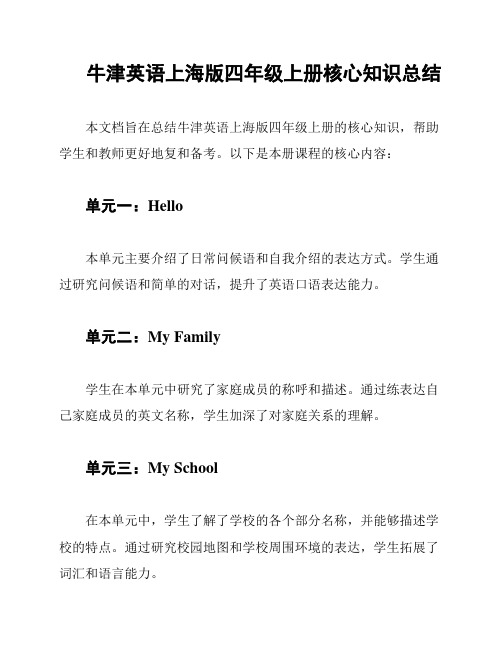
牛津英语上海版四年级上册核心知识总结本文档旨在总结牛津英语上海版四年级上册的核心知识,帮助学生和教师更好地复和备考。
以下是本册课程的核心内容:单元一:Hello本单元主要介绍了日常问候语和自我介绍的表达方式。
学生通过研究问候语和简单的对话,提升了英语口语表达能力。
单元二:My Family学生在本单元中研究了家庭成员的称呼和描述。
通过练表达自己家庭成员的英文名称,学生加深了对家庭关系的理解。
单元三:My School在本单元中,学生了解了学校的各个部分名称,并能够描述学校的特点。
通过研究校园地图和学校周围环境的表达,学生拓展了词汇和语言能力。
单元四:My Hobbies本单元主要介绍了学生的兴趣爱好和日常活动。
学生通过练对自己的兴趣进行陈述和描述,提高了口语表达的流利度。
单元五:Weather and Seasons学生在本单元中研究了天气和季节的表达方式。
通过研究各种天气现象和季节特点的英文表达,学生扩大了词汇量,并且能够描述过去、现在和将来的天气情况。
单元六:Let's Celebrate本单元主要介绍了一些节日和庆祝活动。
学生通过研究各种节日的名称和相关的庆祝活动,了解了不同文化背景下的传统俗。
单元七:My Body在本单元中,学生研究了身体各部位的名称和描述方式。
通过练用英语表达身体部位的动作和感觉,学生提高了对身体的认知和表达能力。
单元八:Time and Daily Routines学生在本单元中研究了时间和日常生活的表达。
通过研究一天的活动安排和时间表达方式,学生掌握了基本的时间概念和日常例行活动的描述。
以上是牛津英语上海版四年级上册的核心知识总结。
希望本文档能够帮助学生复和巩固所学内容,提高他们的英语能力。

1-3单元一单元:时态:一般现在时:标志词:often/usually/sometimes/always/every看时态+看主语单复数,单数注意加s/es.(单三)单词表单词:Weigh 有。
重;重kilogram 千克centimetre 厘米taller 更高的Fan 迷;爱好者fantastic 极好的themselves 他(她/它)们自己Theatre 剧院短语:Go fishing 去钓鱼go swimming 去游泳enjoy oneself(单数:herself/himself/itself 复数:themselves)Get...in...收割( get the crops in )Near 在。
旁边near my house 在我家旁边near the park 在公园旁边That’s fantastic! 那是极好的!知识点总结:In the countryside/city 在农村/城市do exercise 做运动do a lot of exercise 做许许多多运动a lot of 许许多多(修饰可数和不可数,相当于much+many)Play basketball 打篮球play football 踢足球play volleyball 打排球介词考察:by car/bus/bike+交通工具乘坐出租车/公交车by bike/ ride a bike (bikes)At the weekend 在周末时间介词口诀:On Monday/Tuesday/Wednesday/Thursday/Friday/Saturday/Sunday 在周一。
On Sunday morning/afternoon 在周日上/下午at the cinema/theater 在电影院/剧院①早午晚要用in:in the morning/afternoon/ evening 在早/下午/晚上②黎明、中午、夜晚、点用at。
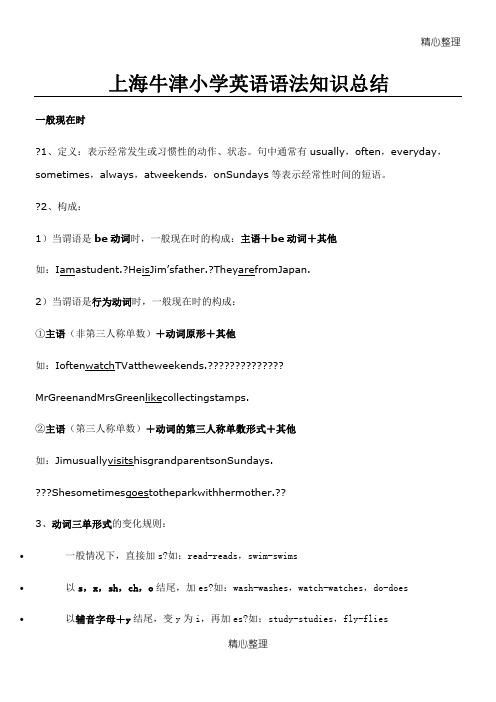
精心整理•一般情况下,直接加s?如:read-reads,swim-swims•以s,x,sh,ch,o结尾,加es?如:wash-washes,watch-watches,do-does•以辅音字母+y结尾,变y为i,再加es?如:study-studies,fly-flies•不规则变化如:have-has•4、一般现在时的句型转换:肯定句否定句一般疑问句及回答They watch TV everyday. They don’twatch TVeveryday.—Do they watch TVeveryday?—Yes,they do./No,they don’t.She watches TVShe doesn’t?watch—Does she watch TVeveryday?如:read-reading,drink-drinking,eat-eating,look-looking•以不发音的e结尾的动词,去掉e,再加ing如:write-writing,make-making,ride-riding,take-taking•以重读闭音节结尾,如末尾只有一个辅音字母,要双写这个字母,再加ing如:sit-sitting,swim-swimming,put-putting,run-running,stop-stopping,get-getting,2、构成:主语+动词的过去式+其他3、动词过去式的变化规则:肯定句否定句一般疑问句及回答—Did he watch TVyesterday? He watched TVyesterday. He didn’twatch TVyesterday.—Yes,he did./No,he didn’t.—Did they play gamesjustnow? They played gamesjustnow. They didn’tplay gamesjustnow.—Yes,they did./No,they didn’t. 一般将来时1、定义:表示将要发生的动作或存在的状态,以及打算、计划或准备某事。
![上海版牛津英语重点知识整[精品]-14页word资料](https://img.taocdn.com/s1/m/1d5a0451f5335a8102d220a9.png)
上海版牛津英语重点知识整理(1A)Unit Sub-topic Let’s learn Let’s talk1 My classroom book ruler pencilrubber pen bag书格尺铅笔橡皮钢笔书包How are you?Fine, thank you.Good morning.Good morning.你好吗?很好,谢谢你。
早上好。
早上好。
2 Numbers one two threefour five six一二三四五六Hi, may. This is Tim.Hello, I’m May.Hello, May.嗨,梅。
这是蒂姆。
你好,我是梅。
你好,梅。
3 My abilities read write drawsing dance jump阅读书写画唱跳舞跳How old are you?I’m five years old..你多大了?我五岁。
4 My body face eye earmouth nose脸眼睛耳朵嘴鼻子Look! This is my hand.This is my arm.看!这是我的手。
这是我的胳膊。
5 Fruit apple orange pearlemon melon peach萍果桔子梨柠檬瓜桃This is an apple.That’s a pear.这是一个苹果。
那是一个梨。
6 Mid-Autumnfestivaltaro moon bean leafmooncake autumn芋头月亮豆叶子月饼秋天What do you like to eat?I like to eat mooncakes.你喜欢吃什么?我喜欢吃月饼。
7 My fanily father mothersister me父亲母亲姐妹我Have you got a brother?No. I have got a sister.你有兄弟吗?不,我有一个姐姐。
第 1 页8 Playtime bicycle doll ballslide swing balloon自行车洋娃娃球滑梯秋千气球He has got a bicycle.She has got a balloon.他有一辆自行车。
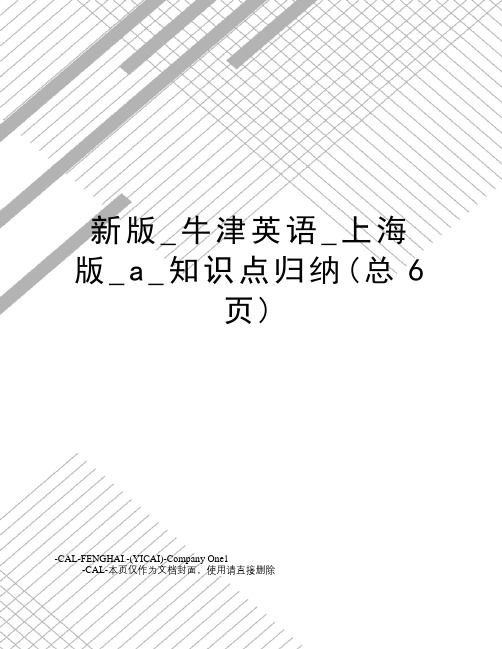

沪教牛津版牛津版七年级下册英语知识点总结Unit4Savethetrees沪教牛津版牛津版七年级下册英语知识点总结Unit4 Save the trees重点短语:1.save vt. 拯救;解救Eg. Let’s do something to save the animals in danger.The police saved the child from the fire.【拓展】save “节省、储蓄” Eg. save money save time【变形】safe adj. safety n.2.discuss vt “讨论” 后接名词(短语)或wh-从句及wh-短语discussion n.Eg. We discussed the problem.We will discuss who should do it.We will discuss what to teach next term.3.leaf n. “树叶”复数:leavesEg. The fall of one leaf is enough to tell the coming of autumn. 一叶知秋。
The leaves turn green in spring. 变绿4.help+do = help + to do “帮忙做……”help+名词+(to)do “帮(某人)做……”Eg. I helped (to) wash the car.I helped him (to) look for his key.【拓展】help+with...或help+名词+with... “在某方面帮忙”Eg.Can I help you with your work?Can you help me with my homework, Mary?5.fight for... “为……而战”fight过去式:foughtfight against “与……作斗争”Eg. He is fighting against his sickness.They fight for freedom.6.provide sb. with sth. = provide sth. for sb. 提供给某人……,为某人提供…… Eg. Sheep provide us with wool. = Sheep provide wool for us.【短语】by the way 顺便说一下 in a way 在某种程度上in the way of sb. 妨碍某人 on the way to...在去……的途中in this way 用这种方法8.keep “使维持(某种状态)”keep+名词+形容词 Eg. The noise kept him awake.keep+名词+副词/介词短语Eg. Don’t keep the boy outside/ in the room.keep +名词+doing Eg. She kept me waiting for half an hour.9.take in... “接受……,吸收……”Eg. The kind man would like to take in the poor boy.Fish take in oxygen through their gills. 鱼用腮吸氧气10.breathe[i:] v. breath[e] n.11.make 普通用词,指任何东西的制造或制造过程Eg.He made the desk himself. produce 正式用词,除表示大量生产制造外,还表示创造Eg. The tree will produce some blossom next year.12.in fact 实际上,事实上。
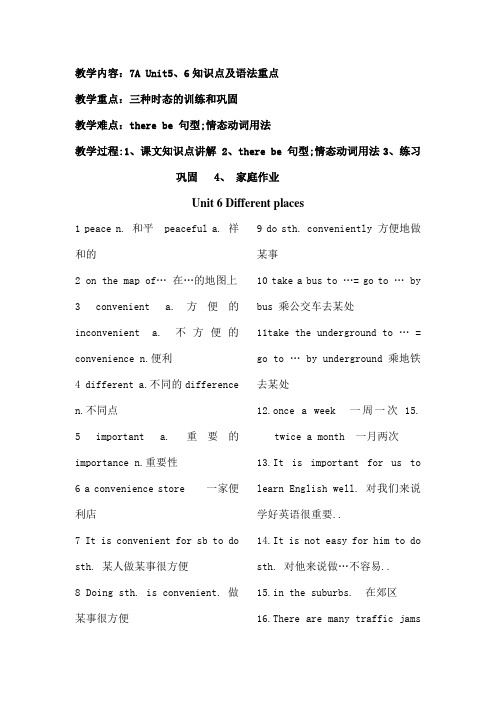
教学内容:7A Unit5、6知识点及语法重点教学重点:三种时态的训练和巩固教学难点:there be 句型;情态动词用法教学过程:1、课文知识点讲解 2、there be 句型;情态动词用法3、练习巩固 4、家庭作业Unit 6 Different places1 peace n. 和平 peaceful a. 祥和的2 on the map of…在…的地图上3 convenient a.方便的inconvenient a. 不方便的convenience n.便利4 different a.不同的difference n.不同点5 important a. 重要的importance n.重要性6 a convenience store 一家便利店7 It is convenient for sb to do sth. 某人做某事很方便8 Doing sth. is convenient. 做某事很方便9 do sth. conveniently 方便地做某事10 take a bus to …= go to … by bus 乘公交车去某处11take the underground to … = go to … by underground 乘地铁去某处12.once a week 一周一次15.twice a month 一月两次13.It is important for us to learn English well. 对我们来说学好英语很重要..14.It is not easy for him to do sth. 对他来说做…不容易..15.in the suburbs. 在郊区16.There are many traffic jams有许多交通堵塞..at the bottom of some steep steps 在陡峭的台阶下面on top of the mountains 在山顶relax oneself 自我放松17. please v. –pleasant a. – pleased a. 取悦;使愉快–令人愉快的–感到愉快的18. please sb. 取悦某人;使某人高兴19. the changes to the lives 生活中的变化20. life in different seasons 不同季节的生活21. seasonal changes 季节的变化22. falling leaves 落叶23. fall -- fell – fallen 落下24. This pair of gloves is black. 这副手套是黑色的..25. The gloves are black.这手套是黑色的..26. What season is it 是什么季节27. in different places 不同的地方be different from …/ the same … as…differences between … and …28.It is + adj + to do sth 做…很…29. once a week 一周一次twice a week 一周两次 three times a week30. noise n. 噪音noisy adj. 嘈杂的noisy; noisier; noisiest31. exciting adj. 令人激动的/excited adj. 感到激动的excite v. 使激动;使兴奋excitement n. 激动;兴奋32. pleasant adj/ 使人愉快的please v. 使高兴 pleased adj. 高兴的;be pleased with sth 对…感33. leaf n. 树叶 leaves pl.到满意的pleasure n. 高兴;愉快 It’s my pleasure.1 现在进行时的用法一、选择题1. Who _____ over there nowA. singingB. are singC. is singingD. sing2. It’s eight o’clock. The students _____ an English class.A. haveB. havingC. is havingD. are having3. Listen The baby _____ in the next room.A. cryingB. criedC. is cryingD. cries4. Look The twins _____ new sweaters.A. are wearingB. wearingC. are wearD. is wearing5. Don’t talk here. Grandparents _____.A. is sleepingB. are sleepingC. sleepingD. sleep6. Tom is a worker. He _____ in a factory. His sisters _____in a hospital.A. work/ workB. works/ workC. is working / are working7. Who _____ English best in your classA. speakB. speaksC. speaking8. Mrs Read _____ the windows every day.A. is cleaningB. cleanC. cleansD. cleaning9. We _____ music and often _____ to music.A. like/ listenB. likes/ listensC. like/ are listening10. She _____ up at six in the morning.A. getB. getsC. getting11. On Sunday he sometimes _____ his clothes and sometimes _____ some shopping.A. wash/ doB. is washing/ is doingC. washes/ does12. The twins usually _____ milk and bread for breakfast; but Jim _____ some coffee for it.A. have/ haveB. have/ hasC. has/ haveD. having / having二、填空:1. My father always __________come back from work very late.2. The teacher is busy. He __________ sleep six hours a day.3. Listen Joan __________sing in the classroom. She often__________ sing there.4. Where __________ you __________ have lunch every day5. The girl __________like wearing a skirt. Look She __________weara red skirt today.2 掌握when引导时间状语从句的用法3 学会运用because引导的原因状语从句4 there beThere be 句型用法总结There be 结构是英语中陈述事物客观存的常用句型;表示“有”;其确切含义是“存在”there作为引导词;本身没有意义;用动词be的某些形式作为谓语动词;它的主语是用一些表示泛指或不定特指的名词词组;动词be和主语的数必须一致..句子最后通常为表示地点和时间的状语..因此要表达“某个地方或某个时间存在什么事物或人”的时候常用“There be + 名词+ 地点时间这一句型..例如:There is a great Italian deli across the street.穿过街道;有一家大的意大利熟食店..There are some students in the dormitory.在宿舍里有一些学生..一、There be 结构中的主谓一致1.当动词be后所接的名词是单数可数名词或不可数名词时;be 应该取单数is;当其后所接的名词是复数的可数名词时;be用复数are..There's a man at the door.门口有个人..There is some apple juice in the bottle.瓶子里有些苹果汁..There are some strangers in the street.大街上有一些陌生人..2.如果There be 后面是几个并列名词做主语时;动词be的形式和最靠近它的那个名词保持数的一致..There is an ashtray and two bottles on the shelf. 架子上有一只烟灰缸和两个瓶子..There are two bottles and an ashtray on the shelf. 架子上有两个瓶子和一个烟灰缸..二、There be 结构中的时态1.There be 句型中动词be可以有一般现在时、一般过去时、将来时和完成时..There is no harm in trying.不妨一试..There were fabulous wildflowers in the hills last spring.去年春天;山中有极美的野花..There will be a fine day tomorrow.明天将是一个晴天..There have been several private schools in our area this year. 今年;我们这里已经有好几所私立学校了..2.There be 句型可以和各种助动词、情态动词连用..There may be a cigarette in that box.那只盒子里或许有支香烟..There must be some cakes on the table.桌子上一定有些蛋糕..There used to be a hospital there before the war.战前;那里曾经有家医院..3.There be 句型也可以和这样一些的谓语动词连用:be going to 、seem to 、appear to 、usedto、be likely to 、happen to ….There seem to be a few trees between me and the green.在我与草坪之间好像有一些树..There is gong to be a meeting tonight.今天晚上有个会议..There is likely to be a storm.可能有一场暴雨..There happened to be a bus nearby.碰巧附近有辆公交车..There appears to have been a nasty accident.似乎发生了一起严重事故..4.there be 结构中除可以用be 外;还可以用其它动词..例如:There came a scent of lime-blossom.飘来一阵菩提树的花香..Once upon a time there lived a king in China.从前中国有一个国王..三、There be 句型的否定句、一般疑问句、特殊疑问句和反意疑问句1.There be 句型的否定句有两种构成方式;一种是将否定副词not放在be 之后;如:There isn’t a box inthe room.房间里没有盒子..There aren’t any pens on the desk.课桌上没有钢笔..2.There be 句型的一般疑问句是将be 放在there 之前;回答时用yes或no;后接简单答语..如:Is there a cake on the table桌子上有块蛋糕吗Yes;there is. / No;there isn’t.是;有../ 不;没有..Will there be a party tonight今晚有聚会吗Yes;there will./ No; there won’t是的;有../ 不;没有..3.There be 句型的特殊疑问句主要有how many和how much做引导词两种情况:How many students are there in your school你们学校有多少学生How much money is there in your pocket你口袋里有多少钱4.There be 句型的反意疑问句There is a cup on the table; isn’t there桌子上有只杯子;是吗There is some orange in the glass; isn’t there杯子里有桔汁;是吗四、There be 结构和have的区别与联系1.区别点:there be 意为存在;强调某地有某物;不表示所属关系;have 表示所有关系;强调某人或某地有某物;这是其基本用法..如:There are some trees in front of the house.房前有些树..Tom has many friends in China.汤姆在中国有许多朋友..2.相同点:在表示结构上的含有时;既可以用there be 句型;也可以用havehas 来表示..如:中国有许多长河..There are many long rivers in China.China has many long rivers.一、句型转换1. There is a computer in my house. 一般疑问句________ ________ a computer in ________ house2. There are some flowers on the teachers’ desk. 一般疑问句_________ ________ _________ flowers on the teachers’ desk3. There are some apples on the tree.否定式 There ________ _________ ________ apples on the tree.4. There aren’t any pears in the box.同义句 There are _________ pears in the box.5. There are fifty students in my class.对划线部分提问________ __________ students are there in your class6. These are cars.用buses改写成选择疑问句 Are thesecars__________ __________7. Two boys are in our house.改为there be句型__________ __________ two boys in our house.二、选择1. The students expected there ________ more reviewing classes before the final exam.A. beB. beingC. have beenD. to be2. There _________ no fresh drinking water and no good farm land; it was not a comfortable place in which to live.A. beB. wasC. wereD. being3. Where _________ dirt; there are flies.A. there hasB. isC. there isD. has there4. There _________ an English teacher and 40 students in the classroom.A. isB. areC. haveD. being5 用以wh- 开头的特殊疑问句进行提问6 掌握“it takes + 时间”的句型1.指时间、季节、天气、距离等..It is 5 kilometers from my home to the school.2.指环境情况等.. It was very noisy outside now. 3.用作人称代词;代替前面提到过的事物..The bike is not mine. It’s Petre’s.4.用以代替指示代词this 或that..---What’s this ---It’s a pen. 5.具有指示代词的作用;指一个人或事物..---Who’s knocking at the door ---It’s me.7 掌握“it is + 形容词+ to do ...”的句型It is + adj + for/of sb to do sth.1.it为形式主语2.不定式表示的动作是由for引导的逻辑主语发出的3.to do sth为真实主语4.用for 的形容词:对事物进行描述的形容词difficult easy hard important necessary convenient dangerous possible impossibleeg: It is difficult for me to choose the right style.It is good for us to eat vegetables.注意:有时可以不带逻辑主语eg: It is wrong to laugh at others when they are in difficulty.It is impossible to learn a language well in two months.用of的形容词:表示人的性格品格的形容词kind good bad nice right wrong wise silly foolish clever careless polite generous rudeeg: It was wrong of him to tell lies.It is stupid of her to make such a mistake.It’s nice of you to offer me a seat.= You are nice to offer me a seat.It was careless of him to lose so many things. = He was careless to lose so many things.语法要点2: adj+ enough to do sth 当主语与to do sth的逻辑主语不一致时用此句型1.adj/adv+ enough enough time fast enough2.enough for sb to do stheg: Her hair is long enough for her to tie back.The question is hard enough for Tom to reply to.3.同义句转换 too… to = not …enough to do sth = so … that …\The boy is too young to go to school.= The boy is not old enough to go to school.= The boy is so young that he can’t go to school.8 掌握乘坐交通工具的两种用法: by...;take the...9 掌握some;any;much; a lot of的用法Unit 7 Signs around us1. direct v. 导向 direction n.方向 director n. 导演2. instruct v. 指导instruction n. 指示3. hike v. hiked – hiked –hiking 远足4. go hiking in the countryside在乡下远足5. No cigarettes. = No smoking.= You mustn ’t smoke. = Don ’tsmoke. 不准吸烟..6. No litter. = You mustn ’tleave rubbish. = Don ’t leaverubbish. 不准乱扔垃圾..7. silent adj. --- silence n.沉默的—沉默8. different adj. –difference n. 不同的—不同点9. important adj. –importance n. 重要的—重要性 10. convenient adj. – convenience n. 方便的 – 便利 11. keep silent = keep quiet 保持安静 12. put up tents and go camping 支起帐篷去野营 13. use v. 使用– useful a. 有用的 useless a.没有用的 14. help v. 帮助helpful a. 有帮助的 helpless a. 没有帮助的 15. care v. 在意– careful a. 仔细的 careless a.不仔细的 16. What does it mean = What ’s the meaning of … 它是什么意思 17. take turns to do sth. 轮流做某事 18. have rules to take care of the environment. 有规则是无论照顾环境.. 19. It ’s your turn to do sth. 轮到你做某事了..20. do sth. silently = do sth. insilence 静悄悄地做某事 21. exit v. 出去 --反-- enter v. 进入 22. exit n. 出口 --反-- entrance n. 入口23. use the telephone for help =call for help 用电话求助24. What does this sign mean =What is the meaning of this sign这个标志是什么意思 mean v. meant; meant meaning n. 25. turn left = turn to the left 向左转on the right of …在......右边26. silent a 安静的 silence n 安静 27. We must not smoke.= No smoking.= Don’t smoke. smoke n. 烟雾 v. 抽烟 28. Good luck 好运 lucky a 幸运的 luckily adv. 幸运地unluckily ad.29. finish doing 完成做某事1 掌握情态动词can 和must 在本单元中的用法1. can 的用法:1.表示能力、许可、可能性.. 表示能力时一般译为“能、会”; 即有种能力;尤其是生来具备的能力;此时may 和must 均不可代替它..如:She can swim fast; but I can’t . 她能游得很快;但我不能..I can see with my eyes. 我用眼睛看..2.表示许可;常在口语中..如:You can use my dictionary. 你可以用我的字典..3.表示推测;意为“可能”; 常用于否定句和疑问句中; 此时can’t 译为“ 不可能”.. 如:Can the news be true 这个消息会是真的吗—Can it be our teacher那个人有可能是我们老师吗—No; it can’t be our teacher. He is on a visit to the Great Wall.不可能..咱们老师正在游览长城呢..例题—I think Miss Gao must be in the library. She said she would go there. —No. She __be there; I have just been there. A.can’t B.mustn’t C.needn’t D.wouldn’t解析根据下文“我刚去过那儿”可知;应为“ 不可能”; can’t 表示推测答案 A2. could的用法:1.can的过去式;意为“ 能、会”;表示过去的能力..如:He could write poems when he was 10. 他十岁时就会写诗..2. could在疑问句中;表示委婉的语气;此时 could 没有过去式的意思..如:Could you do me a favour 你能帮我个忙吗—Could I use your pen 我能用一下你的钢笔吗—Yes; you can.可以..注意回答3. may的用法:1.表示请求、许可;比can 正式;如:May I borrow your bike 我可以借你的自行车吗 You may go home now. 现在你可以回家了..例题—_______ I borrow your MP3 —Sure . Here you are.A. MayB.ShouldC.MustD. Would2 .表示推测;谈论可能性;意为“ 可能; 或许”;一般用于肯定句中.. 如:It may rain tomorrow . 明天可能会下雨..She may be at home. 她可能在家呢.3 .may的过去式为might ;表示推测时..可能性低于may.. 如:He is away from school. He might be sick.他离开学校了;可能是他生病了..4 . 表示希望、祈求、祝愿;常可译为“祝愿”..通常是用may +主+V 例如:May you have a good time. 祝你过得愉快.. May you be happy 祝你幸福 May you succeed祝你成功4. must的用法:1.must 表示主观看法;意为“必须、一定”.. 如:You must stay here until I come back.在我回来之前你必须呆在这儿..Must I hand in my homework right now 我必须现在交作业吗2 其否定形式mustn’t表示“ 一定不要” “千万别” “禁止; 不许”. 如:You mustn’t play with fire. 你不许玩火..You mustn’t be late. 你一定不要迟到..3对must引导的疑问句;肯定回答为must;否定回答为needn’t 或don’t have to .如:—Must I finish my homework我现在必须完成作业吗—No; you needn’t.不;你不必..4must表示有把握的推测;用于肯定句..如: The light is on; so he must be at home now.灯亮着;他现在肯定在家..注意其反意问句的构成形式:当must表示肯定的判断、推测时;其反意疑问句要用实际问句的助动词来构成..如:She must have seen the film before;hasn’t she注意反意疑问句的后半部分You must have met uncle Wang in the shop yesterday;didn’t you 注意反意疑问句的后半部分5. need的用法:1.need 表示需要、必须;主要用于否定句和疑问句中;其否定形式为needn’t;意为“没有必要;不必”.. 用need 提问时;肯定回答为 must;否定回答为needn’t或don’t have to.. 如:—Need I stay here any longer 我还有必要留在这儿吗—Yes; you must .是的..—No. you needn’t /don’t have to. 不; 你不必..2.need 还可以作实义动词;此时有人称、数和时态的变化;如果是人作主语后边多接动词不定式..如:I need to do it right now. 我需要马上做这件事..He needs to learn more about the girl.他需要多了解那个女孩..如果是物作主语;一般用need doing 与 need to be done这种情况下应注意两点:①.主动形式的动名词doing具有被动的含义;②.该动名词可以改为其动词不定式的被动形式而句子的意义不变..例如:. The door needs painting. = The door needs to be painted. 那扇门需要油漆一下..Your car needs mending. = Your car needs to be repaired. 你的车需要维修了..can’t 和 mustn’t1. can’t 根据其基本用法可译为:1不会..如:I can’t speak English . 我不会说英语..2不能..如:We can’t do it now because it’s to o dark.天太黑了;我们现在干不了..3否定句中表示推测..“不可能”;如:The man can’t be our teacher because he is much younger than our teacher.. 那个人不可能是咱们老师;他年轻得多..2. mustn’t 意为“ 禁止、不许”; 用来表达命令;表示强烈的语气.. 如:You mustn’t play football in the street. It’s too dangerous.你不可以在街上踢足球;太危险了..易混点五:must 和 have to1.must 侧重于个人意志和主观上的必要..have to 侧重于客观上的必要;可用于现在时、过去时和将来时..如:I know I must study hard.我知道我必须努力学习..My brother was very ill; so I had to call the doctor in the mid-night.我弟弟病得厉害; 我只得半夜里把医生请来..I haven’t got any money with me; so I’ll have to borrow some from my friend.我身上没带钱;只好向朋友借点了..He said they must work hard.他说他们必须努力工作..2. have to可以用于多种时态;而must只用于一般现在或将来..如:The composition is due to hand in this morning; so I had to finish it last night. 作文今天早晨到期;因此我不得不昨天晚上完成..易混点六: used to do / be used to doing / be used to do…/ be used for doing sthused to do 表示过去常常发生的动作; 强调过去;只用于过去;注意用 todo;不用doing形式;而be used to doing 意为“习惯做…”; be 可有各种时态; be used to do 意为“……被使用去做……;”为被动语态形式..be used for doing sth“用作……”如:My father used to eating meat.我父亲过去起床晚;但现在不得不早起了..She is used to eating meat.她习惯吃肉..He wasn’t used to eating in a restaurant.他不习惯在饭店吃饭..A knife can be used for cutting things.刀可以用来割东西/ A knife can be used to cut things.刀可以用来割东西情态动词练习1. May I stop my car here No; you____.A. can'tB. mustn'tC. needn'tD. don't have to2. Must we clean the house now No; you _______.A. needn'tB. may notC. mustn'tD. can't4. You return the book now. You can keep it next week if you like.A. can'tB. mustn'tC. needn'tD. may not5. Johnny; you play with the knife; you hurt yourself.A. won't...can'tB. mustn't...mayC. shouldn't; mustD. can't...shouldn't6. The fire spread through the hotel very quickly but everyone get out.A. had toB. wouldC. couldD. was able to7. Would you go out for a walk with meNo; I_____..My girl friend is coming.A. wouldn'tB. shall notC. won'tD. shouldn't8. Man die without water. A. will B. can C. need D. shall9. If he started at 9 0'clock; he be there by now.A. needB. shallC. ought toD. must10. I mailed the letter two weeks ago. She_____it.A. must receiveB. can't receiveC. might receiveD. must have received11.The professor gave orders that the experiment before 5:30p.m.A. be finishedB. will finishC. must be finishedD. would be finished12. There was plenty of time. You_____.A. mustn't hurryB. mustn't have hurriedC. needn't hurryD. needn't have hurried13. Tom was a diligent boy. He go to school though it was raining hard.was able to B. could C. couldn't D. wasn't able to14. ______I go back before lunch No; I don't think you________.A. Need...mustB. Do...need toC. Must...have toD. May .... ought to15. The teacher do all the exercises; but a pupil_______.A. needn't....mustB. may not...mustC. needn't....needn'tD. can't....must16. Would you open the window please Yes; I______.A. willB. wouldC. doD. can17. A lion only attacks a human being when it is hungry.A. shouldB. canC. willD. shall18. ____Must I finish this novel this morning____No; you_____.A. mustn'tB. might notC. don't have toD. can't19. The taxi ____ only hold six passengers. It is full. You take the next one.A. may...mayB. can...mayC. may...canD. must...can21. I wish to go home now; IA. mayB. can'tC. mustD. do22. He must have finished his homework; _____heA. mustn'tB. didn'tC. needn'tD. hasn't3 了解turn作名词和动词的用法4 了解land作名词和动词的用法5 学会用“what kind of + 名词”询问种类。
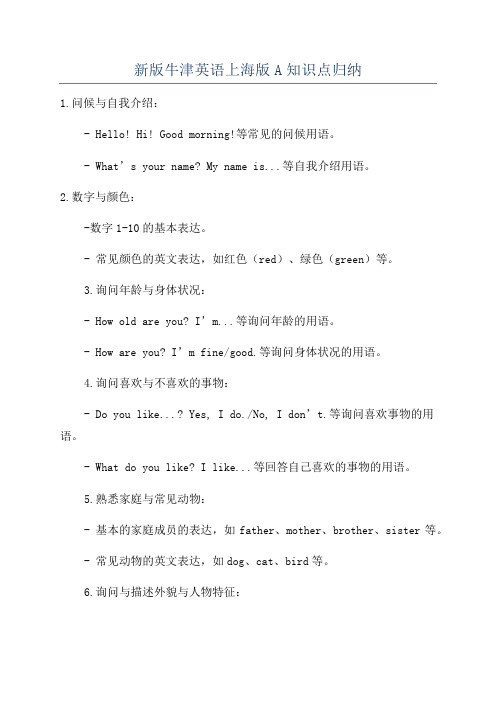
新版牛津英语上海版A知识点归纳1.问候与自我介绍:- Hello! Hi! Good morning!等常见的问候用语。
- What’s your name? My name is...等自我介绍用语。
2.数字与颜色:-数字1-10的基本表达。
- 常见颜色的英文表达,如红色(red)、绿色(green)等。
3.询问年龄与身体状况:- How old are you? I’m...等询问年龄的用语。
- How are you? I’m fine/good.等询问身体状况的用语。
4.询问喜欢与不喜欢的事物:- Do you like...? Yes, I do./No, I don’t.等询问喜欢事物的用语。
- What do you like? I like...等回答自己喜欢的事物的用语。
5.熟悉家庭与常见动物:- 基本的家庭成员的表达,如father、mother、brother、sister等。
- 常见动物的英文表达,如dog、cat、bird等。
6.询问与描述外貌与人物特征:- What’s he/she like? He/She is...等询问与描述外貌与人物特征的用语。
7.学习日常用语:- May I go to the toilet, please? Can I have some water, please?等日常学习用语。
8.描述天气与季节:- What’s the weather like today? It’s sunny/rainy/cloudy.等描述天气的用语。
- 四个季节的英文表达,如spring、summer、autumn、winter等。
9.描述日常活动与习惯:- I get up at 7 o’clock. I go to school at 8 o’clock.等描述日常活动与习惯的用语。
10.描述食物与饮料:- 常见食物与饮料的英文表达,如apple、orange、milk、juice等。
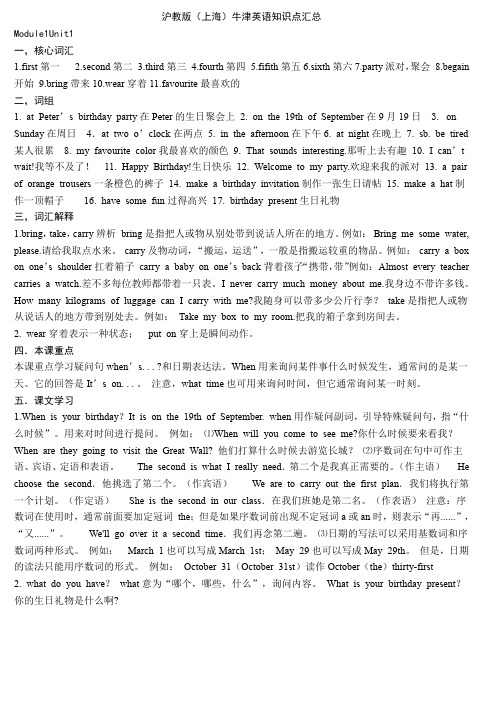
沪教版(上海)牛津英语知识点汇总Module1Unit1一,核心词汇1.first第一2.second第二3.third第三4.fourth第四5.fifith第五6.sixth第六7.party派对,聚会8.begain 开始9.bring带来10.wear穿着11.favourite最喜欢的二,词组1.at Peter’s birthday party在Peter的生日聚会上2.on the19th of September在9月19日3.on Sunday在周日4.at two o’clock在两点5.in the afternoon在下午6.at night在晚上7.sb.be tired 某人很累8.my favourite color我最喜欢的颜色9.That sounds interesting.那听上去有趣10.I can’t wait!我等不及了!11.Happy Birthday!生日快乐12.Welcome to my party.欢迎来我的派对13.a pair of orange trousers一条橙色的裤子14.make a birthday invitation制作一张生日请帖15.make a hat制作一顶帽子16.have some fun过得高兴17.birthday present生日礼物三,词汇解释1.bring,take,carry辨析bring是指把人或物从别处带到说话人所在的地方。
例如:Bring me some water, please.请给我取点水来。
carry及物动词,“搬运,运送”,一般是指搬运较重的物品。
例如:carry a box on one’s shoulder扛着箱子carry a baby on one’s back背着孩子“携带,带”例如:Almost every teacher carries a watch.差不多每位教师都带着一只表。

上海牛津英语六年级上下册全知识点梳理频度副词always/sometimes/usually/never 是频度副词,提问应该要用How often…?在句中的位置是:放在行为动词的前面,放在be动词的后面。
也可以说“行前系后”。
E.g She is always kind.她总是很善良的。
She always helps other people.她总是帮助其他人。
不能出现这样的句子:She is always helps other people.(×)一句话中不能同时出现两个动词。
并且要注意主谓保持一致,尤其注意第三人称单数不可以忽略。
how often 与how many timeshow often 提问“频率次数+时间范围”how many times 提问“频率次数”e.g. —How often do you exercise? —Twice a week.—How many times have you been there? —Twice.副词表示动作特征或性状特征。
一般用来形容或修饰除了名词和代词以外的词,主要修饰形容词、动词、其他副词和句子。
He looks very happy.(修饰形容词)The old lady is walking slowly now.(修饰动词)Luckily, he got the first prize.(修饰句子)形容词后面+ly构成副词:slow—slowly slight—slightly quick—quickly careful—carefully fierce—fiercely immediate—immediately gentle—gently lucky—luckily happy—happily介词What else do you do with your…?你和你的…还干什么?With是个介词,后面接人称代词时,要用宾格的形式。
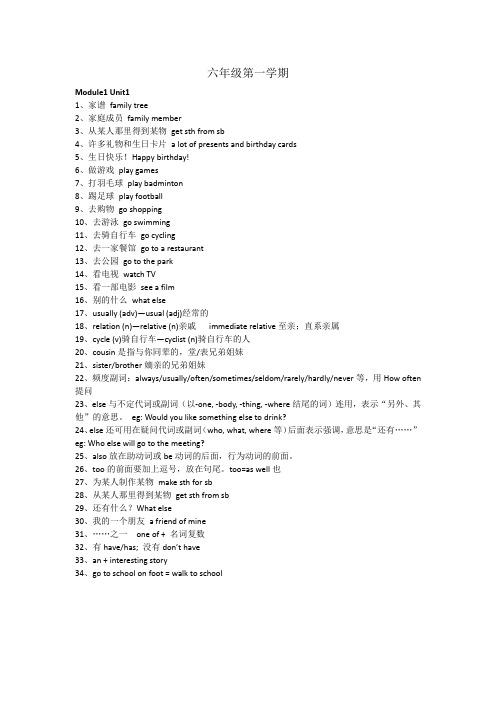
Module1 Unit11、家谱family tree2、家庭成员family member3、从某人那里得到某物get sth from sb4、许多礼物和生日卡片a lot of presents and birthday cards5、生日快乐!Happy birthday!6、做游戏play games7、打羽毛球play badminton8、踢足球play football9、去购物go shopping10、去游泳go swimming11、去骑自行车go cycling12、去一家餐馆go to a restaurant13、去公园go to the park14、看电视watch TV15、看一部电影see a film16、别的什么what else17、usually (adv)—usual (adj)经常的18、relation (n)—relative (n)亲戚immediate relative至亲;直系亲属19、cycle (v)骑自行车—cyclist (n)骑自行车的人20、cousin是指与你同辈的,堂/表兄弟姐妹21、sister/brother嫡亲的兄弟姐妹22、频度副词:always/usually/often/sometimes/seldom/rarely/hardly/never等,用How often 提问23、else与不定代词或副词(以-one, -body, -thing, -where结尾的词)连用,表示“另外、其他”的意思。
eg: Would you like something else to drink?24、else还可用在疑问代词或副词(who, what, where等)后面表示强调,意思是“还有……”eg: Who else will go to the meeting?25、also放在助动词或be动词的后面,行为动词的前面。

上海版牛津小学英语2A Unitl-8知识要点归纳Unitl你居住在哪里?我居住在松江。
我爱松江。
6. Where do you live? I live in Jiading. I love Jiadinge你居住在哪里?我居住在嘉定。
我爱嘉定。
bin 垃圾箱 park 公园 road 路 building 大楼 Shanghai 上海 apple 苹果 bird 鸟 clean 弄干净 sweep 扌弓 desk 书桌floor 地板 where 哪里 live 居住 love 爱use 用every 每一个day 天keep 保持复习巩固:please 请 classroom 教室 bicycle 自行车 slide 滑梯swing 秋千doll 娃娃ball 球balloon 气球point 词汇拓展:home 家the Bund 外滩 tower 塔词汇学习: to 指向举一反三:1. Clean the bicylce, please. 请把自行车弄干净。
2. Clean the classroom, please. 请把教室弄干净。
3. Sweep the classroom, please. 请把教室扫一扫。
4. Sweep the road, please. 请扌巴马路扫一扌弓。
5. Where do you live? I live in Songjiang. I love Songjiang.7.This is my mother. She is a nurse.I love my mother.这是你的母亲。
她是一名护士。
我爱我的母亲8. That is my father. He is a postman. love father.那是我的父亲。
他是一名邮递员。
我爱我的父亲。
9.I love my teacher・ I love my school・我爱我的老师。
我爱我的学校。
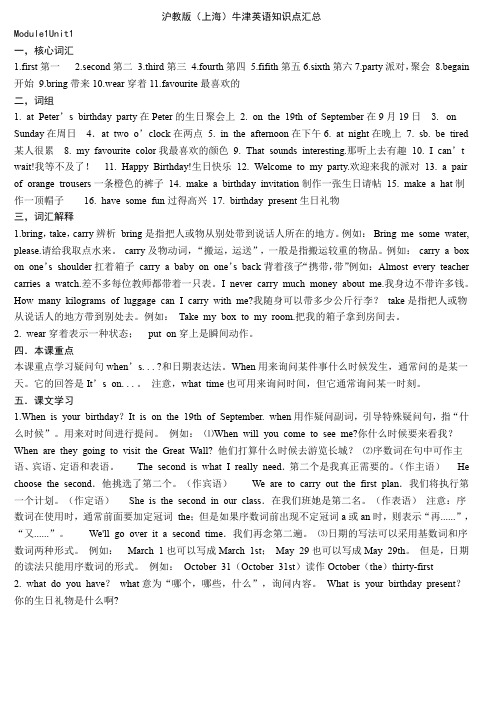
沪教版(上海)牛津英语知识点汇总Module1Unit1一,核心词汇1.first第一2.second第二3.third第三4.fourth第四5.fifith第五6.sixth第六7.party派对,聚会8.begain 开始9.bring带来10.wear穿着11.favourite最喜欢的二,词组1.at Peter’s birthday party在Peter的生日聚会上2.on the19th of September在9月19日3.on Sunday在周日4.at two o’clock在两点5.in the afternoon在下午6.at night在晚上7.sb.be tired 某人很累8.my favourite color我最喜欢的颜色9.That sounds interesting.那听上去有趣10.I can’t wait!我等不及了!11.Happy Birthday!生日快乐12.Welcome to my party.欢迎来我的派对13.a pair of orange trousers一条橙色的裤子14.make a birthday invitation制作一张生日请帖15.make a hat制作一顶帽子16.have some fun过得高兴17.birthday present生日礼物三,词汇解释1.bring,take,carry辨析bring是指把人或物从别处带到说话人所在的地方。
例如:Bring me some water, please.请给我取点水来。
carry及物动词,“搬运,运送”,一般是指搬运较重的物品。
例如:carry a box on one’s shoulder扛着箱子carry a baby on one’s back背着孩子“携带,带”例如:Almost every teacher carries a watch.差不多每位教师都带着一只表。
![[全]沪教牛津版四年级英语上全册单元知识点考点总结](https://img.taocdn.com/s1/m/3b50c2f1ee06eff9aff80759.png)
沪教牛津版四年级英语上全册单元知识点考点总结Unit l Meeting new people知识梳理一、Words:1.meet结识2.new新的3.morning早晨4.classmate同班同学5. her她的6.name名字7.sit坐8.afternoon下午9.his他的10. boy男孩11. here这里12. sister姐姐,妹妹13. girl女孩14. brother兄弟15. nice好的二、Phrases:1. good morning早上好2.good afternoon下午好3.sit here坐在这儿4.your new classmate你的新同学5.my name我的名字6.my classmate我的同学7.her name她的名字8.his name他的名字三、Sentences:1.Nice to meet you.见到你很高兴。
2.My name is Jill.或My name's Jill.我的名字叫Jill。
3.This is your new classmate.这是你的新同学。
4.Her name's Kitty.她的名字叫Kitty。
5.You can sit here.你可以坐在这儿。
6.This is my brother.这是我的兄弟。
7.What about you? 你呢?/你怎么样呢?重点点拨1.Nice to meet you.在第一次见面相互认识时经常会用这句话来问候对方,回答时经常会说Nice to meet you,too.2.注意形容词性物主代词(简称“形物代”)的使用:my(我的),your(你的),his(他的),her(她的),its(它的),our(我们的),your(你们的),their(他们的,她们的,它们的):这些形容词性物主代词后面一定要接名词,即要接人或物。
单词播音园大声朗读下列短文,体会粗写的单词中字母a的发音/eɪ/。
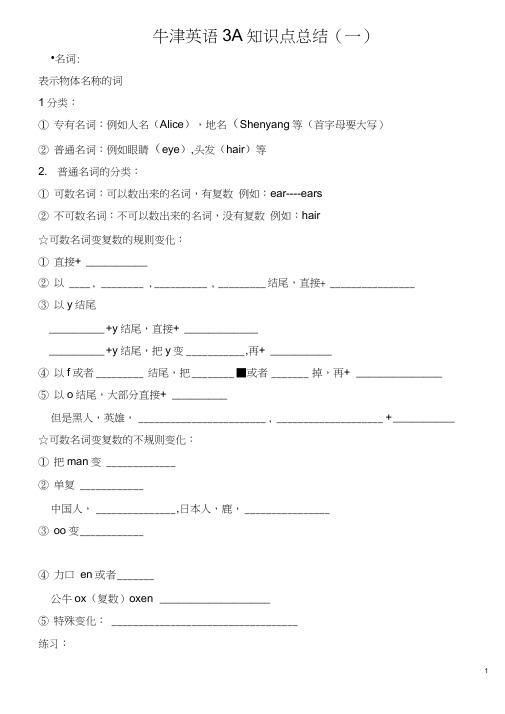
牛津英语3A知识点总结(一)•名词:表示物体名称的词1分类:①专有名词:例如人名(Alice),地名(Shenyang等(首字母要大写)②普通名词:例如眼睛(eye),头发(hair)等2. 普通名词的分类:①可数名词:可以数出来的名词,有复数例如:ear----ears②不可数名词:不可以数出来的名词,没有复数例如:hair☆可数名词变复数的规则变化:①直接+ __________②以 ____ , ________ , __________ , _________ 结尾,直接+ ________________③以y结尾_________ +y结尾,直接+ _____________________ +y结尾,把y变___________ ,再+ __________④以f或者_________ 结尾,把________ ■或者_______ 掉,再+ ______________⑤以o结尾,大部分直接+ _________但是黑人,英雄,________________________ , ____________________ + __________ ☆可数名词变复数的不规则变化:①把man变 _____________②单复 ____________中国人,_______________ ,日本人,鹿,________________③oo变____________④力口en或者_______公牛ox(复数)oxen __________________⑤特殊变化: ___________________________________练习:1•选出不同类的单词()1A Mary B.Miss C.Mr ( )2.A.cat B.sheep C.egg( )3.A.morni ng B.afternoonC.hell o( )4. k B.rice C.doll( )5. A.sheep B.ice-cream C.wolf2•判断下列单词是不是可数名词,如果是写出复数,如果不是,画xl. ________________ h air _____________________ 2.rabbit ___________ 3.eye 4. _________________ ear ____________________ 5.water ____________ 6.friend 7.boy ______________ 8.family ________________ 9.wol _____________lO.peach ___________ ll.sheep ________________ 12.fish ____________13.mouse __________ 14.tomato ______________ 15.zoo ____________kman _________ 17.child ________________ 18.book ___________3. 用所给词的适当形式填空1. These are my ___________ (book).2. Co unt the __________ (chick).3. How many ____________ (boy)? --One ____________ (boy).4. This is my __________ (bed).5.Its __________ (ear) are Ion g. Its tail _________ (be)short. Is a _________ (rabbit).二.冠词:1. 不定冠词:_________ _____________含义:一个(泛指)用法:a+ ______ 母开头的单词前例如:一个大苹果 ___________________an+ _____ 母开头的单词前例如:一个苹果 _____________________2. 定冠词:___________含义:表示这个,那个,这些,那些(特指)用法:①第二次提至U This is a girl. The girl is my friend.②说话双方都知道擦黑板。
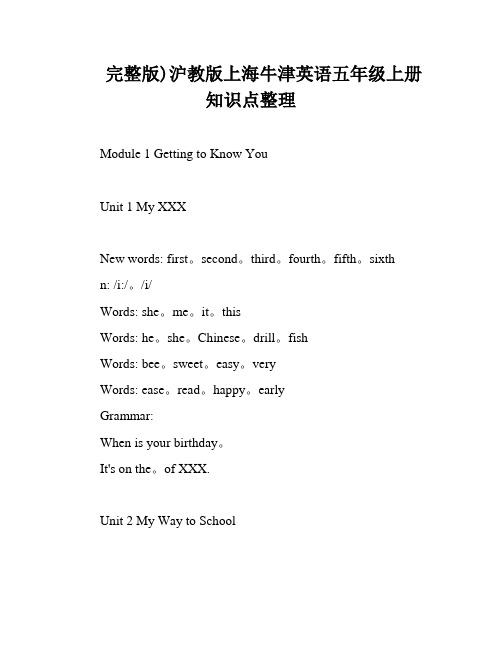
完整版)沪教版上海牛津英语五年级上册知识点整理Module 1 Getting to Know YouUnit 1 My XXXNew words: first。
second。
third。
fourth。
fifth。
sixth n: /i:/。
/i/Words: she。
me。
it。
thisWords: he。
she。
Chinese。
drill。
fishWords: bee。
sweet。
easy。
veryWords: ease。
read。
happy。
earlyGrammar:When is your birthday。
It's on the。
of XXX.Unit 2 My Way to SchoolNew words: taxi。
underground。
zebra crossing。
XXX。
pavementXXX: /e/。
/æ/Words: bed。
pet。
add。
dad。
backWords: any。
many。
apple。
blackWords: head。
breadGrammar:How do you come to school?I come to school。
Unit 3 My FutureNew words: worker。
pilot。
farmer。
cook。
shop assistant n: /p/。
/t/。
/k/。
/g/Words: pick。
map。
taste。
fruitWords: book。
job。
date。
badGrammar:What do you want to be?I want to be a/an。
Module 2 Me。
My Family and FriendsUnit 1 GrandparentsNew words: write an e-mail。
go shopping。
play chessXXX: /a/。
/ar/。
/a:/Words: class。
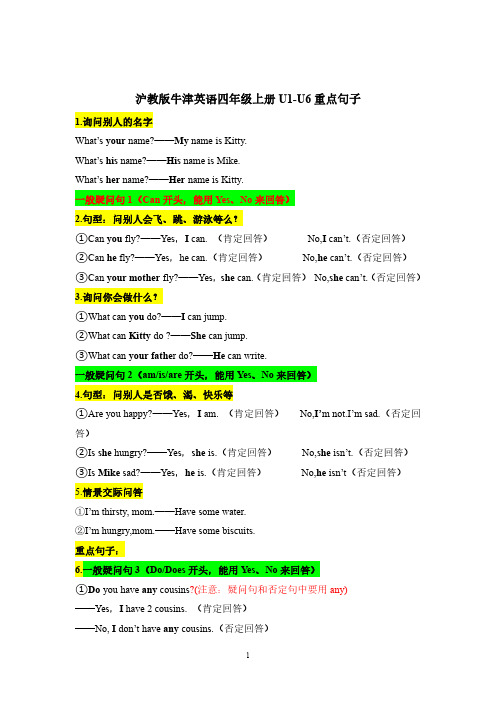
沪教版牛津英语四年级上册U1-U6重点句子1.询问别人的名字What’s your name?——My name is Kitty.What’s his name?——His name is Mike.What’s her name?——Her name is Kitty.一般疑问句1(Can开头,能用Yes、No来回答)2.句型:问别人会飞、跳、游泳等么?①Can you fly?——Yes,I can.(肯定回答)No,I can’t.(否定回答)②Can he fly?——Yes,he can.(肯定回答)No,he can’t.(否定回答)③Can your mother fly?——Yes,she can.(肯定回答)No,she can’t.(否定回答)3.询问你会做什么?①What can you do?——I can jump.②What can Kitty do?——She can jump.③What can your fathe r do?——He can write.一般疑问句2(am/is/are开头,能用Yes、No来回答)4.句型:问别人是否饿、渴、快乐等①Are you happy?——Yes,I am.(肯定回答)No,I’m not.I’m sad.(否定回答)②Is she hungry?——Yes,she is.(肯定回答)No,she isn’t.(否定回答)③Is Mike sad?——Yes,he is.(肯定回答)No,he isn’t(否定回答)5.情景交际问答①I’m thirsty,mom.——Have some water.②I’m hungry,mom.——Have some biscuits.重点句子:6.一般疑问句3(Do/Does开头,能用Yes、No来回答)①Do you have any cousins?(注意:疑问句和否定句中要用any)——Yes,I have2cousins.(肯定回答)——No,I don’t have any cousins.(否定回答)②Does your father have any brothers?——Yes,he has one brother.(肯定回答)——No,he doesn't have any brothers.(否定回答)7.询问年龄?①How old are you?——I’m eight years old.我八岁(years old也可以省略)②How old is your mother.——She is35years old.③How old is your father?——He is40years old.8.询问是谁Who is that,Jill?那是谁?——That's me.那是我!Who is this?这是谁?——This is my uncle.这是我叔叔9.询问是不是某人的...Is this your brother?这是你的哥哥吗?——Yes,it is.是的,你说得对——No,this is my cousin.不,这是我的表哥10.介绍穿着①He has a green T-shirt.他穿着绿色的T恤。
沪教版(上海)牛津英语知识点汇总Module1Unit1一,核心词汇1.first第一2.second第二3.third第三4.fourth第四5.fifith第五6.sixth第六7.party派对,聚会8.begain 开始9.bring带来10.wear穿着11.favourite最喜欢的二,词组1. at Peter’s birthday party在Peter的生日聚会上2. on the 19th of September在9月19日3.on Sunday在周日4.at two o’clock在两点5. in the afternoon在下午6. at night在晚上7. sb. be tired 某人很累8. my favourite color我最喜欢的颜色9. That sounds interesting.那听上去有趣10. I can’t wait!我等不及了!11. Happy Birthday!生日快乐12. Welcome to my party.欢迎来我的派对13. a pair of orange trousers一条橙色的裤子14. make a birthday invitation制作一张生日请帖15. make a hat制作一顶帽子16. have some fun过得高兴17. birthday present生日礼物三,词汇解释1.bring,take,carry辨析bring是指把人或物从别处带到说话人所在的地方。
例如:Bring me some water, please.请给我取点水来。
carry及物动词,“搬运,运送”,一般是指搬运较重的物品。
例如:carry a box on one’s shoulder扛着箱子carry a baby on one’s back背着孩子“携带,带”例如:Almost every teacher carries a watch.差不多每位教师都带着一只表。
I never carry much money about me.我身边不带许多钱。
How many kilograms of luggage can I carry with me?我随身可以带多少公斤行李?take是指把人或物从说话人的地方带到别处去。
例如:Take my box to my room.把我的箱子拿到房间去。
2. wear穿着表示一种状态;put on穿上是瞬间动作。
四.本课重点本课重点学习疑问句when’s...?和日期表达法。
When用来询问某件事什么时候发生,通常问的是某一天。
它的回答是It’s on...。
注意,what time也可用来询问时间,但它通常询问某一时刻。
五.课文学习1.When is your birthday?It is on the 19th of September. when用作疑问副词,引导特殊疑问句,指“什么时候”。
用来对时间进行提问。
例如:⑴When will you come to see me?你什么时候要来看我?When are they going to visit the Great Wall? 他们打算什么时候去游览长城?⑵序数词在句中可作主语、宾语、定语和表语。
The second is what I really need.第二个是我真正需要的。
(作主语)He choose the second.他挑选了第二个。
(作宾语)We are to carry out the first plan.我们将执行第一个计划。
(作定语)She is the second in our class.在我们班她是第二名。
(作表语)注意:序数词在使用时,通常前面要加定冠词the;但是如果序数词前出现不定冠词a或an时,则表示“再......”,“又......”。
We'll go over it a second time.我们再念第二遍。
⑶日期的写法可以采用基数词和序数词两种形式。
例如:March 1也可以写成March 1st;May 29也可以写成May 29th。
但是,日期的读法只能用序数词的形式。
例如:October 31(October 31st)读作October(the)thirty-first2. what do you have?what意为“哪个,哪些,什么”,询问内容。
What is your birthday present?你的生日礼物是什么啊?Module1Unit2一,核心词汇1.taxi出租车2.underground地铁3.zebra crossing斑马线4.traffic lights红绿灯5.pavement 人行道6.live住7.leave离开8.on foot走路9.arrive 到达10.cross横过11.by通过二,词组1. ride his bike to school骑自行车去学校2. walk to school / go to school on foot走路去学校3.leave home离开家4.at a quarter to eight在七点三刻5. live near school住的离学校近6. arrive at school到达学校7. cross the road穿过马路8. at traffic lights在红路灯处9. wait for the green light等绿灯10. on the pavement在人行道上11. look left向左看/向右看12. at zebra crossings在斑马线的地方13. underground station地铁站14. take the train坐地铁15. get off the train下地铁16. at...Station在...站17. take Bus No.12 乘12路公交车18. get off at Rainbow Road Bus Stop 在彩虹路站下车19. from the bus stop to Rainbow Primary School从车站到彩虹小学三,词汇解释1.live⑴lively 有“活泼的、快活的、生动的”等意思,可以指人或物,可作定语或标语;但它没有“活着的”意思,而其他三个都有。
如:Young children are usually lively.小孩子们通常是活泼的。
He told a very lively story.他讲了一个生动的故事。
⑵alive、live、living都有“活的、有生命的”意思,如:This is a live (=living) fish. (=This is a fish alive.)这是一条活鱼。
Who's the greatest man alive (=living man)? 谁是当今最伟大的人物?(指人,不能用live)The fish is still alive (=living) 那条鱼还活着。
(指动物作表语时不能用live)。
(3)只有living前加the方可表示“活着的人”,作主语时,视作复数。
如:The living are more important to us than the dead.活着的人对我们来说比死去的人更重要。
2. arrive arrive 表示“到达某地”时,后面要接介词,到达的地方范围大是多用in,地方较小时用at,如:We arrived in Paris.我们到达巴黎。
We arrived at the station.我们到达车站。
reach 后面直接跟表示地点的词。
He reached London. 他到达了伦敦。
get to 到达What time shall we get to Shanghai? 我们什么时候到达上海四.本课重点本课的重点是how的用法,意为“怎样,怎么”,用来询问方式,方法;介词by,on的用法五.课文学习1. How do you come to school, Alice? ★how用来提问方式、方法。
一般用on foot,by bus等来回答。
★come 的意思是“来;到来”,不及物动词。
2. When do you arrive at school?At about eight o’clock.表达在几点的介词用atLook left and look right before you cross the road。
cross这里是动词,意为“穿过”。
Module1Unit3一,核心词汇1.worker工人2.piolet飞行员3.farmer 农民4.shop assistant店员5.fiy飞6.help帮助7.sick 生病的二,词组 1. 想做某事want to do sth.2. 飞行员/医生/厨师/农民/营业员pilot / doctor / cook / farmer / shop assistant 3.fly an aeroplane in the sky在空中开飞机4.help sick people帮助病人 5. cook nice food烧美味的食物6. grow vegetables种蔬菜7. give lessons to students给学生上课8. sell things 卖东西9. doing a survey做一个调查10. in the street在街上11. Can I ask you some questions? 我能问你一些问题吗?12. in the future在未来,将来13. dream job梦想的职业14. work at home在家工作15. travel around the world环游世界16. be afraid of doing sth. 害怕做某事17. be good at singing擅长唱歌18. hear a cry听到一阵哭声29. Jump into the lake跳进湖中20. You’re brave.你很勇敢21. froggy / chick青蛙/小鸡三.词汇解释help的用法:(1). vt. 帮助,通常用help sb. with sth.或help sb. (to) do sth.形式。
如:Can I help? 要我帮忙吗?Can I help you? 我能为你效劳吗?(向顾客主动提供帮助时的用语,与上一句在语境、功能上不一样。
)Would you like me to help you? 要我帮忙吗?We are going to help Mrs. Li (to) clean the house.我们要去帮李太太打扫房间。